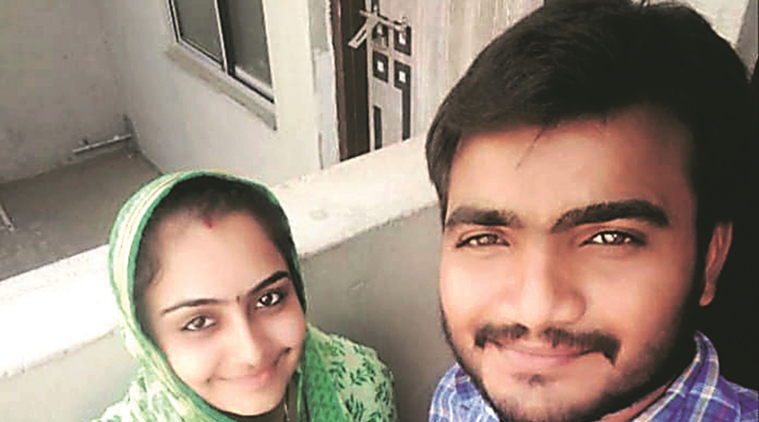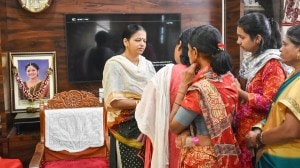- India
- International
Gujarat Dalit man murder: Abhayam team did not perceive threat, was taken aback
On Monday, Haresh was killed in the presence of the Abhayam team, one member of which, Bhavika, is the complainant and eyewitness in the case.
 Solanki, from Gandhidham in Kutch, married Urmila Zala almost six months ago but her parents had brought her back to Varmor on the outskirts of Ahmedabad in May. Urmila, who is two months pregnant, is missing, said police.
Solanki, from Gandhidham in Kutch, married Urmila Zala almost six months ago but her parents had brought her back to Varmor on the outskirts of Ahmedabad in May. Urmila, who is two months pregnant, is missing, said police.
When the team from the 181 Abhayam helpline arrived on Monday evening in Varmor village to convince and counsel 25-year old Haresh Kumar Solanki’s in-laws, to let his wife Urmila return with him, it did not perceive any threat and was therefore unprepared for the fatal attack on its distress caller.
Speaking to The Indian Express, Milind Torawane, Commissioner of Women and Child Development department in the state, which runs Abhayam, told The Indian Express, that usually based on the assessment of a situation, the team calls for back-up. “For example, often in cases of say, domestic violence, the team calls for a back-up police team. The entire team is trained in dos and don’ts and any time they feel insecure, appropriate precaution is taken by them,” he said. “However, this was a rarest-of-rare case and the team did not perceive the situation to be one of threat.”
The brief for Abhayam 181 — a toll-free round-the-clock emergency service for women — also includes sending out rescue teams if necessary. Rescue teams, comprising a counsellor, an unarmed lady police constable deputed by the district police department and a driver, often arrive in vans equipped with live GPS tracking and first-aid kits.
READ | ‘We were constantly threatened’, says father of slain Gujarat Dalit man
The 181 helpline was introduced as a pilot project in 2014 by then Chief Minister Anandi Patel. It went state-wide in March 2015, and a mobile application was launched on August 5, 2018 by Chief Minister Vijay Rupani.

Torwane said the 181 helpline receives about seven lakh to eight lakh calls every year. Of these, approximately three lakh are serious calls where counselling or further engagement – in terms of police aid, legal aid, or medical aid – is required. Of the three lakh calls, 30,000 cases are such that rescue teams have to be dispatched. Once the rescue teams arrive at the spot, depending on the situation and their assessment of it, they call for a back-up team.
On Monday, Haresh was killed in the presence of the Abhayam team, one member of which, Bhavika, is the complainant and eyewitness in the case.
Abhayam is relied upon for its rapid response time. “We also have tie-ups with network service providers for getting the location of a caller,” Torawane said. “We have had situations wherein suicide calls were received and the location information was crucial (in preventing the suicide).”
READ | In Gujarat, Dalit man hacked to death by upper caste in-laws as officials watched
An Abhayam’s counsellor’s role may also include counselling a family. They tread a fine line in doing this. Torwane said the common reaction to counsellors is: “Who are you to meddle in our family matters?” Family matters may range from cases of dowry harassment in-laws, or caste tensions in the case of inter-caste love affairs.
“There is no mediation like (in the instance of cases before) a khap panchayat but our priority is the caller and their safety, usually females but sometimes males as well, calling to complain about issues being faced by the women they know – say a father or friend calling about cases of eve-teasing,” said Torawane.
Another mechanism to help women in distress is the One Stop Centre (OSC) named Sakhi, which also functions under the ministry of women and child development. OSCs are intended to support women affected by violence within the family, community and at the workplace in both private and public spaces. The scheme however, remains relatively unknown in the state. During a recent case in the Gujarat High Court, Justice Sonia Gokani pulled up a joint secretary of the women and child department on April 15 for ineffective implementation of the scheme in the state. Justice Gokani said in the courtroom, “Instead of one stop, it becomes two stop. If you can’t implement it, scrap it.” She also asked how the WCD department expects women in distress to avail of the facilities, if she as a judge was getting to know about the scheme only in the courtroom.
In an order in June, Justice Gokani said the scheme should be given wide publicity and that awareness should be spread among the police too about it.
A recent case that came to Abhayam involved counselling a 19-year old mother who was addicted to the mobile-based game PUBG and wanted to divorce her husband to stay with her PUBG gaming partner.
Torawane draws a distinction between the work of Sakhi and Abhayam. He says, “Sakhi involves more long-term support-centric assistance. Abhayam is involved in cases that require rapid response to a situation.”
As of April, Sakhi was being implemented in nine districts in the state. The OSC guidelines state that such centres will be integrated with the 181 and other existing helplines for women and that the district collector/district magistrate is the responsible authority to set up the OSC.
As per Union WCD Minister Smriti Irani’s reply to a Lok Sabha question this Parliament session, Sakhi has been implemented across the country since 2015.
Apr 26: Latest News
- 01
- 02
- 03
- 04
- 05








































